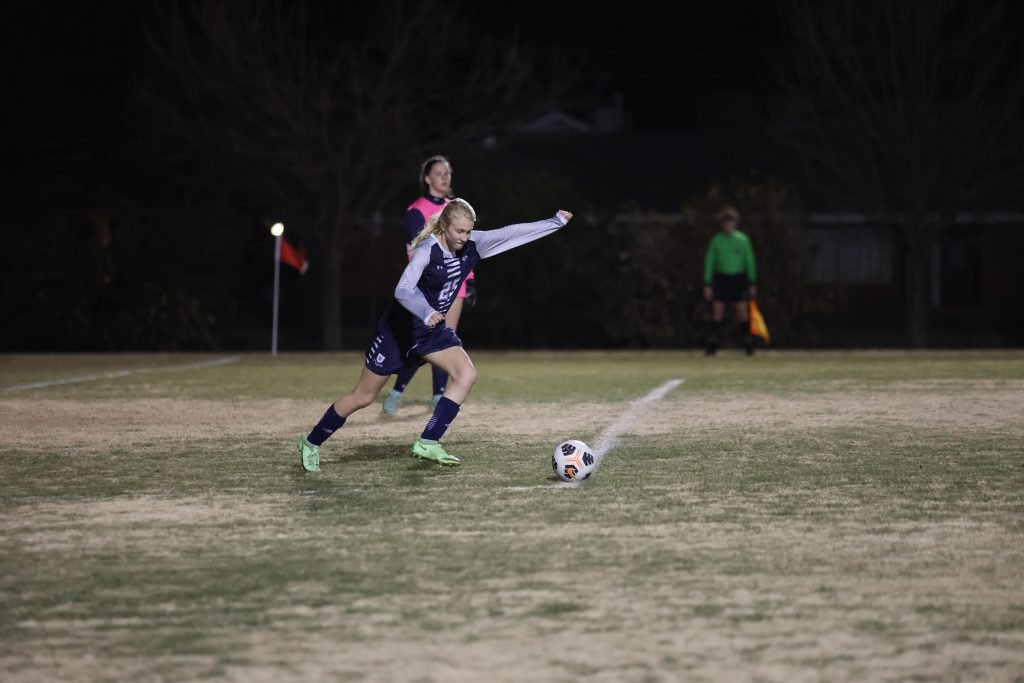Casady Soccer Brought Out of the Cold
Most everyone with a connection to Casady school has some level of understanding about the decision Casady has made to switch from the SPC to the OSSAA. What some people may not be aware of, however, is that this switch will force some students to make difficult decisions for themselves. One such decision lies heavily on the minds of Casady Upper Division Soccer athletes; With the switch from SPC to OSSA, both UD Men’s and Women's Soccer will shift from being a winter to a spring sport. This raises several questions, chief among them being ‘will these players have to choose between soccer and another spring sport that they have played in the past?’ and ‘how will this affect the Casady soccer teams if players are forced to choose between soccer and another sport?’
Casady Men’s Soccer Coach, Chris Halpern, is one person on Casady’s campus who has a complete understanding of these issues and their possible impacts on the teams. These changes may at first glance seem like a bleak future for the team, but Halpern did not hesitate to say that he “expect[s] Casady to be extremely competitive and to win most of their games in the OSSAA.” While it will certainly be fun for players to experience success on the playing field, some parents and players might question whether this could defeat some incentive players have had in the past to train harder than perhaps they would feel the need to with less competition. Despite the fact that there is no clear answer to this question until the spring sports season of 2024 actually begins, Casady is fortunate enough to have a coach who has coached OSSAA teams in the past. “From 1997 to 2002, I was at Classen School of Advanced Studies, where I coached their middle division soccer team and their high school girls soccer team in the OSSAA,” says Halpern. His twenty-five seasons of experience coaching soccer in both the SPC and the OSSAA are what gives him the right to be so confident in Casady’s ability to win the vast majority of its games.
Not only will this change drastically affect the average amount of games Casady’s UD soccer teams win per season, but it will also affect things like the overall capacity for enjoyment during practice. Players will certainly appreciate the opportunity to kick a ball without the stinging pain that often comes with the none-too-welcome mixture of cold air, stiff feet, and a fast collision with a cold ball. “Whenever it’s really cold, I just have no interest [in the game] because I can only focus on the pain I’m in,” says player Rachel Zewdie (‘25). Players can also look forward to less travel time, ergo more time to keep up with school work, and a small step closer to getting the recommended eight hours of sleep per night.
There is no way to tell how much the size of the team will grow or diminish with the coming change; Some students who usually play soccer and another sport in the spring will have to decide between the two, and some students who have wanted to play soccer in the past, but played a different sport in the winter, will now have the opportunity to play both sports. Joseph Zacharias (‘25) is facing this exact dilemma as he struggles to decide between playing soccer again once it changes to a spring sport, or running track, another sport he is passionate about. When asked which sport he is more likely to pick come spring of 2024, Zacharias paused, deliberating, and eventually said, “I’ll choose track.” Both Zacharias and Zewdie agree that this will be a problem for the vast majority of current UD soccer players; Zacharias reasons that “the best people in soccer will probably stay, for the most part,” but Zewdie is also convinced that the team might “lose a lot of [players].”
Despite the uncertainties that will come in the future about the changes Casady is making in its sports program regarding the UD soccer teams, players and coaches alike are overwhelmingly in favor of the decision for a plethora of reasons. One reason, however, seems to burn brightly at the forefront of almost every player’s mind; “I think the Spring season will make a lot more sense,” says senior Luis Lopez, “because, you know, it’s a lot warmer.” Students look forward to more enjoyable games and practices, where they will be able to put their full energy and focus into the game instead of biting winds or single-digit temperatures. Students and coaches all seem to agree that the good aspects of the switch (more enjoyable temperatures, less travel time, and more opportunities to win games) far outweigh the less appealing factors (the possible loss of players).

